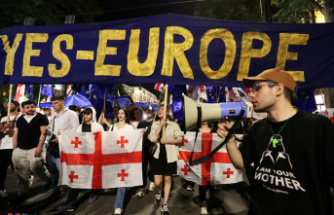Tunisian director Youssef Chebbi obtained, on the evening of Saturday March 4 in Ouagadougou, the supreme award from Fespaco, the largest African film festival, whose 28th edition was held despite a heavy security context due to jihadist violence that is undermining Burkina.
The young director born in Tunis in 1984 won the Etalon d'or de Yennenga for his film Ashkal. Hailing "extreme rigor" and "out of the ordinary work", the president of the jury, the Tunisian Dora Bouchoucha, said that the Gold Standard had been awarded to Mr. Chebbi unanimously.
In this thriller set in the Jardins de Carthage in Tunis, a neighborhood abandoned after the fall of President Ben Ali in 2011, two police officers investigate mysterious immolations. "It's a detective story but in fact it's about the Tunisian people," said Dora Bouchoucha.
Selected for the fortnight of directors at the Cannes Film Festival in France, Ashkal also won the Antigone d'or, the highest award at the Montpellier Mediterranean Film Festival (south-eastern France) in 2022.
The prize was awarded to a representative of the director, absent, by the Burkinabé transitional president, Captain Ibrahim Traoré, who came to power by a putsch in September 2022, wearing his usual red beret and dressed in a trellis. The Tunisian director is ahead of two women, the Burkinabè Apolline Traoré for Sira who receives the Silver Stallion, and the Kenyan Angela Wamai for Shimoni, awarded the Bronze Stallion. Fifteen fiction feature films were competing for the supreme reward, the Yennenga Gold Stallion, a prize worth 20 million CFA francs (about 30,000 euros).
Tunisia triumphs
Since its creation in 1969, no woman has won the supreme award of this great African film festival, for which 170 works were in the running in various categories. The theme of this edition was "African cinema and the culture of peace". The male and female interpretation prizes go to all the actors and actresses of Sous les Figues, by Tunisian director Erige Sehiri. The best screenplay was awarded to Bleu du Caftan, by Moroccan Maryam Touzani.
Tunisia therefore triumphs in this festival of African cinema, at a time when hundreds of nationals from sub-Saharan Africa are fleeing the country because of attacks and demonstrations of hostility following a violent charge by President Kais Saïed against the irregular migrants.
This 28th edition of the festival was held in a very heavy security context in Burkina, shaken by jihadist violence for several years. Security devices, gates, excavations, armed soldiers and police, were put in place in front of the various places of the festival which welcomed 20,000 guests, according to the organization. The next edition of Fespaco is to be held in 2025.
Despite this context, screenings took place with people displaced by jihadist attacks, in Kaya (centre north) and Dédougou (centre west). The attacks, which mainly affect the northern half of the country, have not ceased. Burkina Faso has experienced an intensification of violence by groups linked to Al-Qaeda or the Islamic State since the beginning of the year, with several dozen deaths - civilians or soldiers - almost every week.












